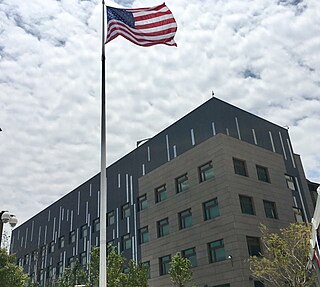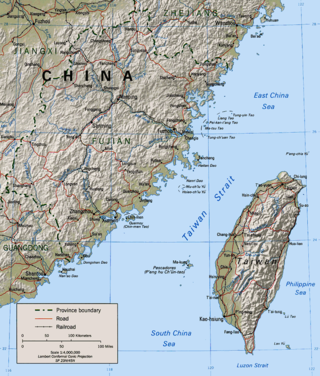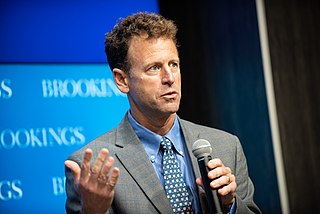
The American Institute in Taiwan is a de facto embassy of the United States of America in Taiwan. AIT is a wholly owned subsidiary of the federal government of the United States in Taiwan with Congressional oversight. The AIT was officially created as a U.S. government-sponsored nonprofit, private corporation established under the auspices of the U.S. government to serve its interests in Taiwan.

The Brookings Institution, often stylized as Brookings, is an American think tank that conducts research and education in the social sciences, primarily in economics, metropolitan policy, governance, foreign policy, global economy, and economic development.

Therese Shaheen (夏馨) is an American businesswoman and entrepreneur who served as Chairman and Managing Director of the American Institute in Taiwan (AIT) from 2002 to 2004.

The Third Taiwan Strait Crisis, also called the 1995–1996 Taiwan Strait Crisis or the 1996 Taiwan Strait Crisis, was the effect of a series of missile tests conducted by the People's Republic of China (PRC) in the waters surrounding Taiwan, including the Taiwan Strait from 21 July 1995 to 23 March 1996. The first set of missiles fired in mid-to-late 1995 were allegedly intended to send a strong signal to the Republic of China government under President Lee Teng-hui, who had been seen as "moving its foreign policy away from the One-China policy", as claimed by PRC. The second set of missiles were fired in early 1996, allegedly intending to intimidate the Taiwanese electorate in the run-up to the 1996 presidential election.

Michael Hayden Armacost is a retired American diplomat and a fellow at Stanford University's Freeman Spogli Institute. He was acting United States Secretary of State during the early days of the administration of President George H. W. Bush, before Secretary James Baker was confirmed by the Senate. Armacost also served as United States Ambassador to Japan and the president of the Brookings Institution from 1995 to 2002.

The First Taiwan Strait Crisis was a brief armed conflict between the People's Republic of China (PRC) and the Republic of China (ROC) in Taiwan. The conflict focused on several groups of islands in the Taiwan Strait that were held by the ROC but were located only a few miles from mainland China.

Richard Nathan Haass is an American diplomat. He was president of the Council on Foreign Relations from July 2003 to June 2023, prior to which he was director of policy planning for the United States Department of State and a close advisor to Secretary of State Colin Powell in the George W. Bush administration. In October 2022, Haass announced he would be departing from his position at CFR in June 2023. He was succeeded by former U.S. trade representative Michael Froman.

Michael Edward O'Hanlon is an American policy analyst currently serving as director of research and senior fellow of the foreign policy program at the Brookings Institution. He began his career as a budget analyst in the defense field.
Kenneth Guy Lieberthal is an American professor and politician known as an expert on China's elite politics, political economy, domestic and foreign policy decision making, and on the evolution of US-China relations.

The School of International and Public Affairs (SIPA) is the international affairs and public policy school of Columbia University, a private Ivy League university located in Morningside Heights, Manhattan, New York City. SIPA offers Master of International Affairs (MIA) and Master of Public Administration (MPA) degrees in a range of fields, as well as the Executive MPA and PhD program in Sustainable Development.
Robert L. Suettinger is an American international relations scholar currently serving as a senior advisor at The Stimson Center and an advisor to the Inter-Parliamentary Alliance on China (IPAC). He was national intelligence officer for East Asia at the National Intelligence Council (NIC) from 1997 to 1998 during the Clinton administration. While there, he oversaw the preparation of national intelligence estimates for the director of the Central Intelligence Agency. His areas of specialty are the People's Republic of China and the North Korean nuclear weapons program.

James Braidy Steinberg is an American academic and political advisor, and former United States deputy secretary of state. He has served as the dean of the Paul H. Nitze School of Advanced International Studies (SAIS) at Johns Hopkins University since November 1, 2021. Prior to his deanship, he was a professor at the Maxwell School of Citizenship and Public Affairs at Syracuse University

James M. Lindsay, is the senior vice president, Director of Studies, and Maurice R. Greenberg Chair at the Council on Foreign Relations (CFR) and a leading authority on U.S. foreign policy. He is also the award-winning coauthor of America Unbound: The Bush Revolution in Foreign Policy and former director for global issues and multilateral affairs at the National Security Council. In 2008, he was the principal author of a Department of Defense funded $7.6 million Minerva Research Initiative grant entitled "Climate Change, State Stability, and Political Risk in Africa." He is the author of a CFR blog on American foreign policy, The Water's Edge.

Kurt Michael Campbell is an American diplomat and businessman serving as the United States deputy secretary of state since 2024. He previously served as National Security Council coordinator for the Indo-Pacific from 2021 to 2024. In this capacity, Campbell had been referred to as the Biden administration's "Asia coordinator" or "Asia czar"—chief architect of Joe Biden's Asia strategy.

After the United States established diplomatic relations with the People's Republic of China (PRC) in 1979 and recognized Beijing as the only legal government of China, Taiwan–United States relations became unofficial and informal following terms of the Taiwan Relations Act (TRA), which allows the United States to have relations with the Taiwanese people and their government, whose name is not specified. U.S.–Taiwan relations were further informally grounded in the "Six Assurances" in response to the third communiqué on the establishment of US–PRC relations. The Taiwan Travel Act, passed by the U.S. Congress on March 16, 2018, allows high-level U.S. officials to visit Taiwan and vice versa. Both sides have since signed a consular agreement formalizing their existent consular relations on September 13, 2019. The US government removed self-imposed restrictions on executive branch contacts with Taiwan on January 9, 2021.
Bates Gill is an American international relations scholar specialized in Chinese foreign policy and politics, currently serving as executive director of Asia Society's Center for China Analysis. He formerly was Director of the Stockholm International Peace Research Institute (SIPRI).

Douglas Haines Paal is vice president for studies at the Carnegie Endowment for International Peace, where he directs the endowment's Asia Program. He served as the director of the American Institute in Taiwan from 2002 to 2006 and worked on the National Security Council staffs of Presidents Reagan and George H. W. Bush between 1986 and 1993 as director of Asian Affairs, senior director, and special assistant to the President. He was vice chairman of JPMorgan Chase International from 2006 to 2008. He also serves as a member of the board of trustees of the Asia Foundation.
Bonnie S. Glaser is managing director of the Indo-Pacific Program at the German Marshall Fund of the United States. She was previously a senior adviser for Asia and the founding director of the China Power Project at the Center for Strategic and International Studies. Glaser is also a non-resident fellow with the Lowy Institute in Sydney, a senior associate with CSIS Pacific Forum, and a consultant for the U.S. government on East Asia. Glaser writes extensively on Chinese policy, including its foreign and military policy towards the United States., Cross-Strait relations, China's relations with Japan and Korea, Chinese perspectives on missile defense, and multilateral security in Asia.
Janne E. Nolan was an American academic, foreign policy advisor, and expert on nuclear arms control and nonproliferation. She held senior positions in the Department of State, as a staffer for the Senate, and served on multiple blue ribbon commissions. She was well known for supporting generations of women in the traditionally male dominated field of nuclear security.
Ryan Hass is an American foreign policy analyst currently serving as director of the Brookings Institution's John L. Thornton China Center and the Chen-Fu and Cecilia Yen Koo Chair in Taiwan Studies.














